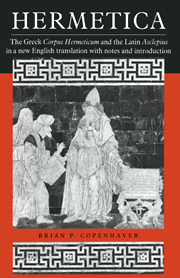 Hermetica
Hermetica Published online by Cambridge University Press: 05 September 2013
[1]“Now, my son, we must speak about soul and body and say in what way the soul is immortal and whence comes the energy that composes and dissolves the body. Death actually has nothing to do with this. Death is a notion that arises from the term ‘immortal’: either it is an empty usage, or, through the loss of the first syllable, ‘immortal’ is taken to mean ‘mortal.’ Death has to do with destruction, yet none of the things in the cosmos is destroyed. If the cosmos is a second god and an immortal living thing, it is impossible for any part of this immortal living thing to die. All things in the cosmos are parts of the cosmos, but especially mankind, the living thing that reasons.”
[2]“God is in reality the first of all entities, eternal, unbegotten, craftsman of the whole of existence. But by his agency a second god came to be in his image, and by him this second god is sustained, nurtured and immortalized, as from an eternal father, everliving because he is immortal. In fact, the everliving differs from the eternal. God did not come to be by another's agency, and, if he came to be, it was by his own agency. He never came to be, 〈however〉; he comes to be always. {This is the eternal being through whom the universe is eternal,} the father who is eternal because he exists through himself.[…]
To save this book to your Kindle, first ensure no-reply@cambridge.org is added to your Approved Personal Document E-mail List under your Personal Document Settings on the Manage Your Content and Devices page of your Amazon account. Then enter the ‘name’ part of your Kindle email address below. Find out more about saving to your Kindle.
Note you can select to save to either the @free.kindle.com or @kindle.com variations. ‘@free.kindle.com’ emails are free but can only be saved to your device when it is connected to wi-fi. ‘@kindle.com’ emails can be delivered even when you are not connected to wi-fi, but note that service fees apply.
Find out more about the Kindle Personal Document Service.
To save content items to your account, please confirm that you agree to abide by our usage policies. If this is the first time you use this feature, you will be asked to authorise Cambridge Core to connect with your account. Find out more about saving content to Dropbox.
To save content items to your account, please confirm that you agree to abide by our usage policies. If this is the first time you use this feature, you will be asked to authorise Cambridge Core to connect with your account. Find out more about saving content to Google Drive.